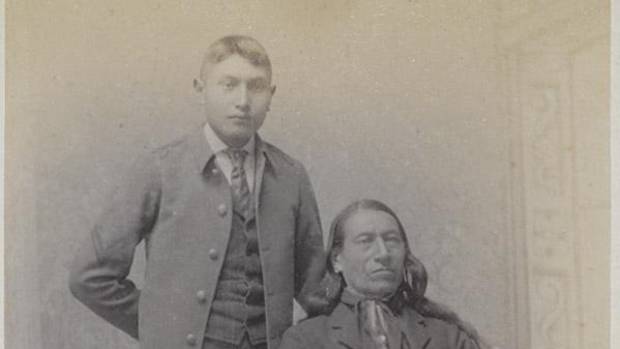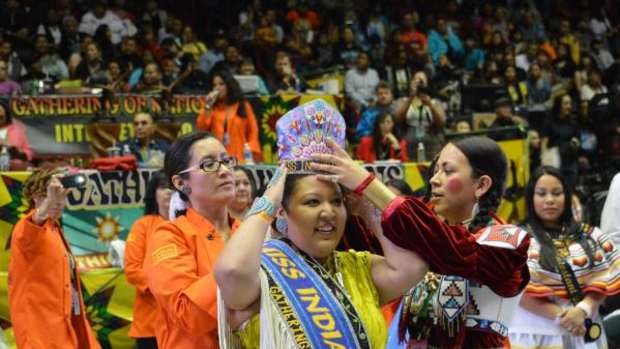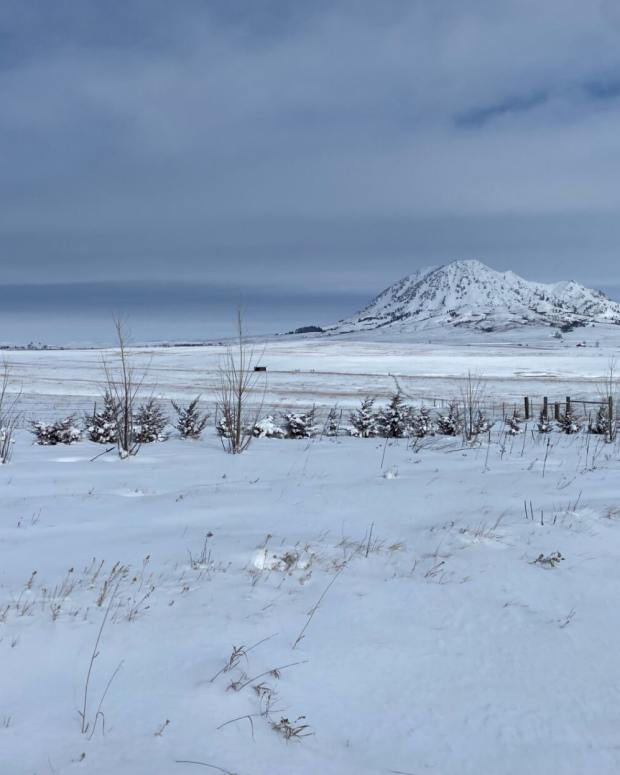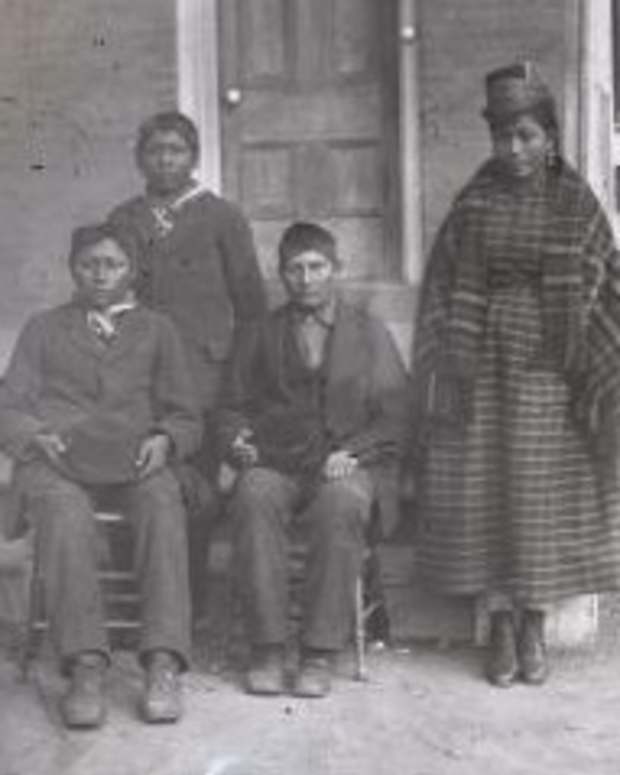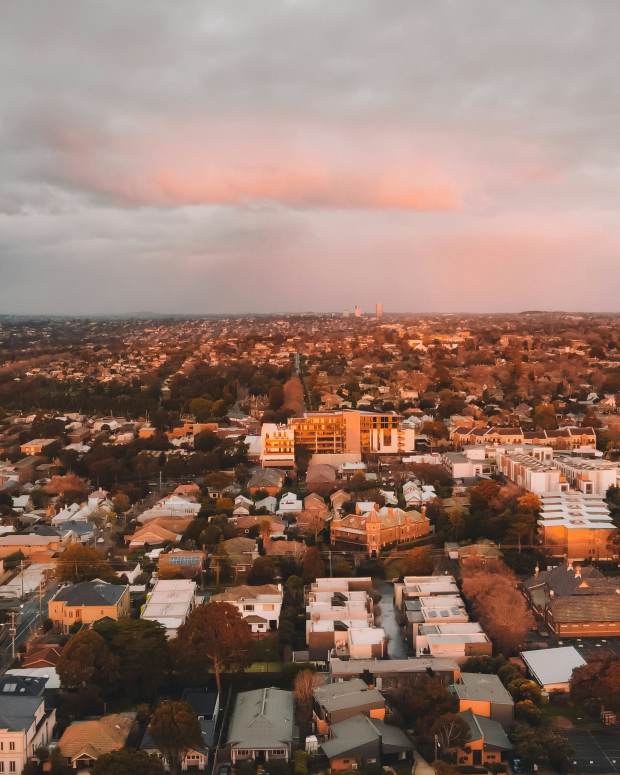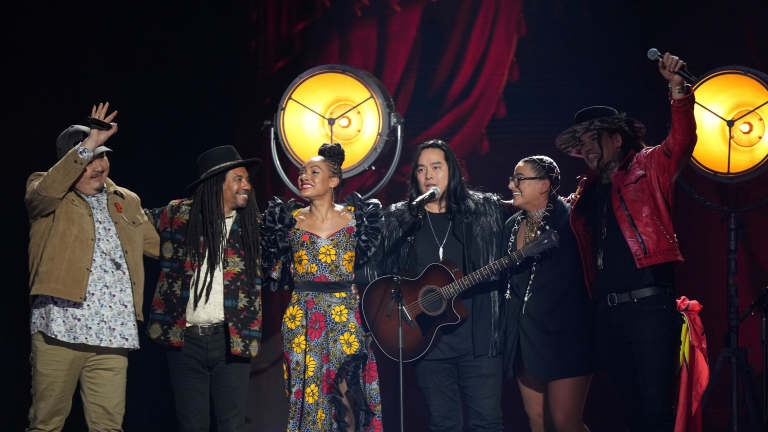
Indigenous musicians bring home record wins at Juno Awards
You can help elevate meaningful stories from Indigenous nations when you support ICT during Arizona Gives Day! ICT is headquartered in Arizona, and covers the Indigenous world across North America. Help us reach our goal to raise $10,000 for reliable, compelling, Indigenous-led journalism in Arizona and beyond.
Miles Morrisseau
ICT
Indigenous artists took home an unprecedented number of statues in Canada’s top music awards Sunday, March 24, in a ceremony that featured a strong presence of Indigenous voices, songs and place.
Artist Aysanabee, Oji-Cree from Sandy Lake Nation, Ontario, was the big winner at the awards, taking home statues for Songwriter of the Year and Alternative Album of the Year for his release, “Here and Now.”
Aysanabee was among five Indigenous artists to win awards in six categories after more than 20 artists were nominated across multiple categories in Canada’s version of the Grammy Awards.

Aysanabee poses with the Juno Awards for Songwriter of the Year and Alternative Album of the Year during the Juno Awards in Halifax, Nova Scotia, on Saturday, March 23, 2024. (Darren Calabrese/The Canadian Press via AP)
Indigenous artists had a record number of nominations this year in mainstream categories, going beyond the traditional Indigenous music categories.
Aysanabe, who grew up in a remote part of Ontario about 1,000 miles northwest of Toronto, took the opportunity to give credit to Ishkode Records, the first Indigenous- and female-owned record label in Canada.
SUPPORT INDIGENOUS JOURNALISM. CONTRIBUTE TODAY.
“I grew up in a trailer in northern Ontario without electricity and running water. Now I’m here,” he told a cheering audience.
“I wrote a speech, but there's not time for it,” he said. “I’m just going to skip to the most important part — recognition of the people that helped bring me Amanda Rheaume and Shoshona Kish who founded the first Indigenous- and female-owned record label in the country.”
The awards ceremony, which was televised from Halifax, Nova Scotia, put a spotlight on Indigenous music, which is not limited by time, space or genre. That versatility could not have been expressed more clearly than by the collaborative performance Elisapie, Jeremy Dutcher, Wolastoqiyik (Maliseet), and Morgan Toney, Mi'kmaq from Wagmatcook First Nation, with a gorgeously enthralling blend of traditional and electronic beats, classical and contemporary instruments and chorus and melody in Indigenous languages.
Related stories:
—Indigenous artists break out in Canada’s Juno Awards
—Indigenous rocker Robbie Robertson dies at 80
Another highlight of the broadcast was the performance of “The Weight,” the classic song made famous by The Band and written by the late Robbie Robertson. The song was performed in honor of Robertson, Mohawk, Six Nations of the Grand River, who died Aug. 9, 2023, at the age of 80.
Juno nominees Aysanabee, William Prince, Logan Staats, Shawnee Kish, Allison Russell and Julian Taylor took turns singing lead and sharing in the uplifting chorus.
All five performers had been nominated for their own work. Prince, Peguis First Nation, took home the award for Best Contemporary Roots Album for his album, “Stand in Joy,” in a category filled with Indigenous artists. Staats, Six Nations of the Grand River, was nominated for his release, “Light in the Attic,” and Julian Taylor, of Mohawk descent, was nominated for “Beyond the Reservoir.”
Prince thanked a string of people who helped him produce the album, including his fiancé for inspiring the record, and then closed with a shout-out to his home community.
“To all the youth of the Peguis First Nation, it takes a real village to lift somebody like myself so high, so thank you so much for this honor,” he said. “And stand in joy. Stand in joy.”
Elisapie, Inuk, took home the award for Contemporary Indigenous Recording for her album, “Inuktitut,” which features covers of popular songs performed in her language. The album was inspired by her uncles who formed a rock-and-roll band after surviving residential school.
Read More
The songs represent the journey of her family and her people to navigate a new way of life.
“I dedicate this album to my uncles, to my family in Salluit Nunavik,” she said in accepting her award. “‘Inuktitut’ the album is not just a cover album. It tells a story of three decades in such a short, short, short time. We were nomads and then we had to settle into communities.”
She shared with the audience the role of music in her community.
“I think music was very important,” she said. “And I just want to mention this because I'm not just an artist. Actually, artists in Inuktitut doesn't even have a name. Because we're all creators. We're all meant to be free.”
Joel Wood, Maskwacis Cree Nation, took home the award for Best Traditional Indigenous Album for his release, “Sing.Pray.Love.” Wood has been singing his whole life as a member of a powwow family and of the multi-Grammy nominated Northern Cree.

Musician Morgan Toney, Mi'kmaq, is among a record number of Indigenous musicians nominated for Canada's Juno Awards for 2024. His "Resilience" album is nominated for Traditional Roots Album of the Year. (Photo by Matthew Ingraham, courtesy of Ishkode Records)
As his beats played out over the loud speakers, Wood’s powwow-danced his way to the stage.
“Oh man, we are just so thankful. I did not have a speech; I just came for the food,” he joked. “I want to recognize my beautiful wife, who is included on this entire album. It wouldn't have been possible without her. I want to recognize my parents back home, Steve Wood, Hilda Wood, back in Maskwacis Treaty Six territory.”
Wood also thanked the studio on the reserve, Grey Willow Studios in Fort Yates Standing Rock, and kids making noise anyway they can.
“I want to give a shout out to all those little rez boys, rez girls back home who turned over their mom's laundry basket and they jam them powwow songs and Sundance sound and prayer songs,” he said.
Blue Moon Marquee continued its winning streak, taking home the hardware for Best Blues Album for “Scream, Holler and Howl.” Marquee is lead by A.W. Cardinal, Cree/Métis, and Jasmine Collette. The pair recently cleaned up at Canada’s top awards for the blues, winning best songwriter, entertainer, record of the year and acoustic entertainer of the year at the Maple Blues Awards.
“We did not plan to win at all,” Cardinal said. “The nominees are so wonderful, everyone. I'm kind of speechless right now.”
Collette took the opportunity to acknowledge the long ignored, forgotten or denied role that Indigenous music played in the creation of the music now celebrated as blues, rock and pop.
“I really want to acknowledge with deep,deep gratitude and respect,” she said. “the Indigenous and Black artists who .. are the original creators of this genre called blues, and the profound impact that it's had on all these genres that we're all celebrating tonight.”
Collette also thanked those female pioneers who helped create the music.
“Mildred Bailey, Memphis Minnie, Ma Rainey, Bessie Smith —they have still not gotten their due and this is this is all for them. Thank you.”
The sharp rise in Indigenous nominations for the 2024 Juno Awards followed a year in which no Native performers were nominated in the U.S. for a Grammy award in the Best Regional Roots Album category, which includes Native American, Hawaiian, Cajun, zydeco, New Orleans, polka and other roots music.
Juno Award Winners
*Songwriter of the Year: Aysanabee, for songs from his release, “Here and Now.” Also nominated: William Prince, Peguis First Nation.
*Alternative Album of the Year: Aysanabee, “Here and Now.” Other Indigenous nominees: Jeremy Dutcher, a Wolastoqiyik (Maliseet) member of the Tobique First Nation, for ,“Motewolonuwok,” and Kish for her release, “Revolution.”
*Contemporary Roots Album of the Year: William Prince, Peguis First Nation, for his album, “Stand in Joy.” Other Indigenous nominees were Logan Staats, Six Nations of the Grand River, for “Light in the Attic,” and Julian Taylor, of Mohawk descent, for “Beyond the Reservoir.”
*Blues Album of the Year: “Scream, Holler & Howl,” by Blue Moon Marquee. Marquee is led by A.W. Cardinal, Cree/Metis, and Jasmine Collette. The pair recently cleaned up at Canada’s top blues awards, winning songwriter, entertainer, record and acoustic entertainer of the year honors at the Maple Blues Awards.
*Contemporary Indigenous Artist or Group of the Year: Elisapie, Inuk, for “Inuktitut.” Other Indigenous nominees: Aysanabee, “Here and Now”; Shawnee Kish, “Revolution”; Blue Moon Marquee, “Scream Holler & Howl”; and Bekka Ma’iingan, “Zoon.”
*Traditional Indigenous Artist or Group of the Year: Joel Wood, Maskwacis Cree Nation, for the album, “Sing. Pray. Love.” Other Indigenous nominees were Nimkii and the Niniis, with “LFS5”; The Bearhead Sisters for the album, “Mitòòdebi (For My Relatives)”; The Red River Ramblers, with “Reverie”; and Young Scouts, with “Drum Nation.”
Other Indigenous nominees
*Album Artwork of the Year: Inuk singer/songwriter Elisapie received a nod for her album, “Inuktitut,” as did the Snotty Nose Rez Kids for their album, “I’m Good, HBU?”
*Music Video of the Year: Snotty Nose Rez Kids were joint nominees with Sterling Larose for the album, “Damn Right.”
Our stories are worth telling. Our stories are worth sharing. Our stories are worth your support. Contribute $5 or $10 today to help ICT carry out its critical mission. Sign up for ICT’s free newsletter.
